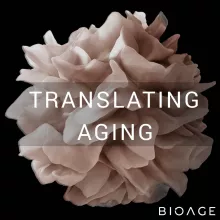Episode shownotes
Jacob Kimball is the Head of Research and co-founder of NewLimit, a company aiming to develop epigenetic reprogramming therapies to treat age-related diseases and extend human healthspan.
In this episode, Chris and Jacob have an in-depth discussion about NewLimit’s mission and approach. They explore how NewLimit is leveraging epigenetics and machine learning to search for new ways to reverse cell aging without changing cell identity. NewLimit is systematically testing combinations of biological factors that can reprogram cell age, using both biological experimentation and computational modeling at scale, and Jacob shares insights into the cutting-edge science and technology behind this work: how functional genomics allows NewLimit to run hundreds to thousands of experiments in a single dish, how machine learning is used in their research, and the challenges of translating epigenetic reprogramming from the lab to the clinic.
Listeners will gain a deeper understanding of the promise of epigenetic reprogramming to revolutionize how we treat aging and age-related disease.
The Finer Details:
- Epigenetics as a regulator of gene expression in cell differentiation and aging
- NewLimit’s mission and approach to tackling the challenges in aging research through epigenetic reprogramming
- The potential for age reversal built into our biology
- How NewLimit is using machine learning and biological experimentation in combination to generate new hypotheses and discoveries
- The potential for epigenetic reprogramming to improve the function of the aging immune system The biggest challenges in translating these discoveries to medicines, including delivery, pharmacokinetics, and ensuring safe and durable effects
- A vision for how rejuvenation biotech could transform health and society in the coming decades if key breakthroughs are made
Quotes:
"Epigenetics is this layer of regulation that tells your cell, ‘Which genes can I use from my genome, at which times?’"
"Our goal as a company is to increase human health span, and the way I like to frame that more colloquially is we want to increase the number of happy, healthy years each person gets to spend on Earth."
“Even with just those sorts of data available, we're already able to build models that perform better than randomly searching through the experimental hypothesis space, and already performed better than our rough heuristics about which interventions might be most impactful.”
"We know that you can actually just express these four genes and reprogram even an old cell all the way back to an embryonic-like state, which not only changes the cell's type, the role it's playing, but also its age."
"Our approach is trying to discover ways we can reprogram cell age without reprogramming cell type."
"The challenge that we run into is that there are so many combinations that very quickly it would become intractable to line up enough test tubes to test them all.”
"Transient interventions could have durable phenotypic benefits for a patient. However, that space hasn't been explored very richly. We know very little about just how long some of these interventions last."
“I think what I'm strongly hopeful for is that, if such medicines are to exist, that you can actually increase the number of happy, healthy years each one of us gets.”
“I think in the next five to 10 years, we're going to see some of the first applications of this technology and the clinics, some of the first proof points, that these interventions actually can benefit patients in a material way.”
“What I hope that means for someone like myself is that the number of years in which I can plausibly consider hiking the John Muir Trail increases in a measurable way. And likewise, for those of you with other hobbies, I hope that these sorts of...
